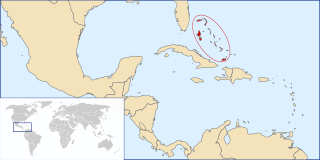1892- Late 1990s
In 1892, a telegraph cable was laid between Jupiter, Florida and the western district of New Providence, coming ashore in Goodman’s Bay, Bahamas. [1] The area then became known as "Cable Beach." [1] On October 5, 1906, the first telephone system was introduced with 150 subscribers in Nassau. [2]
Bimini got wireless telegraphy in 1920 and Grand Bahama opened its first Telegraph Station in West End in 1925. [3] On December 16, 1933, the first telephone service to the United States from the Bahamas was introduced.
After World War II, the Telecommunications Department, of The Bahamas began to make steady progress in its development. Frequency shifters, the first in the Caribbean, were installed in 1946. An automatic time of day announcer was installed in Nassau in 1951, the very first outside of the continental US. Nine years later, in 1960, a Forward Tropospheric Scatter was installed between Delaporte and Florida City, the second of its kind in this hemisphere, the first being in Cuba.
In 1966, the Government of The Bahamas, by an Act of Parliament, incorporated the Telecommunications Department as the Bahamas Telecommunications Corporation, a quasi-governmental corporation, known as Batelco. In 1967, the formerly expatriate-run Batelco got its first all-Bahamian Executive team, under the direction of R.E. Knowles, the first Bahamian General Manager.
In 1971, direct distance dialing was introduced for Batelco operators and in 1972, under new General Manager Aubrey E. Curling, a $7 million submarine cable was installed from West Palm Beach to Eight Mile Rock through a joint venture agreement between AT & T and Batelco.
Robert Bartlett took the reins of the Corporation on October 15, 1979, when he became General Manager. Under Mr. Bartlett’s administration, Batelco moved from its rented location in the Chase Building on Thompson Boulevard to its own offices on John F. Kennedy Drive, where the company’s headquarters is currently located.
In 1986 the Corporation joined the Caribbean Association of National Telecommunications Organizations (CANTO) and hosted its annual meeting and trade show, as well as acquiring the assets of The Grand Bahama Telephone Company. It was also in the late eighties that Cellular Telephone Service was inaugurated in The Bahamas.
In 1990, Robert Bartlett retired and Barrett Russell succeeded him as General Manager. In February 1992, fibre optics became a part of the Batelco system, enabling system upgrades throughout the archipelago, including Inagua where service was introduced in March of that year.
Sir Albert Miller took over as Executive Chairman of Batelco in 1995. The following year, on April 10, 1996, an agreement was signed for the engineering and installation of the Bahamas II Submarine Cable and, on August 26, Batelco entered the internet market with the introduction of Batelnet.
The 1990s ended with the introduction of CLASS to residential customers, bringing them caller id, automatic recall and a number of other features. The end of the millennium also saw significant upgrades to its fiber optic system, including a 26 million dollar cable between Vero Beach, Florida and Eight Mile Rock owned by a consortium with Batelco and AT&T as the Terminal parties.
From BATELCO to BTC
The new millennium also marked a change from the name Batelco. On September 4, 2002, the company transitioned to the acronym BTC.
In the mid-2000s, the GSM (Global System for Mobile) telephone system was introduced and replaced TDMA (Time Division Multiple Access ).
During this time, the submarine BDSNI cable was introduced, connecting 14 islands of The Bahamas.
In 2006, the BHi or Bahamas Haiti International marked the first time BTC partnered with another nation. Using the BDSNI cable, BTC links Port-au-Prince, Haiti with Matthew Town, Inagua providing the neighbouring nation with Vibe, I-Connect, GSM, WiFi and other products and services .
In 2007 BTC partnered with Cisco Networks to build a new Multiprotocol Label Switching (MPLS) backbone. This new network allowed BTC to provide new internet-protocol (IP) services to their customers.
In late 2007, in conjunction with the Ministry of Health, BTC tested a pilot program that allowed medical experts in New Providence to read the vital signs of a patient located at a Ministry of Health clinic in Coopers Town, Abaco.
During 2007 the Six Sigma program was created to reduce the response time to both fault resolution and the installation of services. The Universal Customer Service Representative (CSR), was designed to allow a CSR to work across different technologies, products and services, serving as a “one-stop shop” for BTC customers.
In 2008, a new online directory, bahamasypages. com was also introduced.











